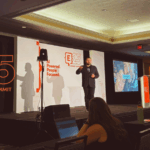Higher education is a rewarding industry. Every day, whether we come to campus or work from our home office, we know we’re positively impacting the world by connecting audiences to educational opportunities.
Higher education is also an industry that provides many opportunities for growth and professional development. If you are willing to move or relocate, you’ll find ample opportunities to secure a new job with a higher salary and a better title. The field is competitive, however, with many qualified candidates competing for a relatively small number of open positions.
As I write this article, I have been job hunting at various levels, from passively looking to actively and intentionally seeking a change for the better part of a calendar year. I have limited geographic restrictions and prioritize both salary growth and career advancement equally. This experience has provided insights into the industry’s strategies for attracting and retaining talent, revealing positive and negative aspects.




